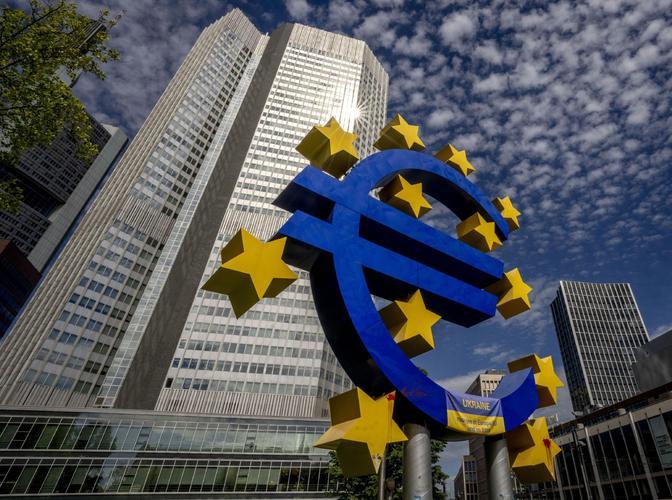
Recently, the European economy has once again fallen into a vicious cycle of "low growth high inflation weak consumption". The latest report from the European Commission shows that the expected GDP growth rate for the Eurozone in 2025 has been lowered from 1.3% to 0.9%, and the German economy is facing zero growth risks. At the same time, although the inflation rate in the eurozone has dropped from 2.4% in 2024 to 2.1%, service sector inflation remains stubbornly above 3%, leading to three consecutive years of negative real wage growth. Personal consumption, as the core driving force of economic growth, is pushing Europe towards the edge of stagflation due to its weak trend.
The disconnect between wage and price growth in Europe is essentially a dual result of lagging labor market reforms and the transfer of energy transition costs. The capacity utilization rate of the German mechanical engineering industry has dropped to 68%, the lowest level since 2009, but companies are still responding to cost pressures through layoffs rather than salary increases. The tax burden rate for French companies is as high as 42%, coupled with the "Key Raw Materials Act" requiring a self-sufficiency rate of 40% for lithium and rare earths by 2030, forcing companies to transfer 15% of their transformation costs to their wage accounts. This contradiction is even more acute in southern European countries. Italy's debt/GDP ratio is expected to reach 134.8% by 2025, and the government has frozen the minimum wage standard at the 2022 level to meet EU fiscal rules. The proportion of household consumption expenditure to GDP in Spain has decreased from 63.8% in 1995 to 56.5%. Excess savings are concentrated among the elderly population, and young people are forced to cut back on consumption due to the pressure of buying a house. According to a survey by the European Central Bank, 62% of respondents believe that "wage growth can never keep up with price increases," and this self fulfilling mechanism of expectations is solidifying the trend of consumption contraction.
The collapse of personal consumption presents a "triple blow" characteristic. Although TTF natural gas prices have fallen 60% from their peak in 2022, they are still 40% higher than the average price in 2019. The industrial electricity price in Germany is 2.3 times that of the United States, directly leading to a 22% year-on-year decline in profits in the chemical industry. BASF Group was forced to transfer some of its production capacity to Louisiana, USA. After the United States imposed a 15% benchmark tariff on EU goods, the German automotive industry was the first to bear the brunt. Volkswagen Group's sales in the United States decreased by 18% in the second quarter, forcing it to cancel its original 3 billion euro expansion plan. This external demand contraction is transmitted through the supply chain to component suppliers and logistics companies, forming a negative cycle of "tariffs layoffs consumption decline". Germany's deficit rate may exceed 3.5%, while France's fiscal deficit accounts for 6.1% of GDP, resulting in an 18 month delay in the EU's recovery fund expenditure compared to the plan. The Italian government has reduced household subsidies by 40% in order to control debt costs, directly impacting the consumption capacity of low - and middle-income groups.
The European Central Bank's policy operations are caught in a dilemma: on the one hand, Germany's August CPI rose by 6.4% year-on-year, while Spain's inflation accelerated to 2.4%, indicating that core inflation stickiness remains strong; On the other hand, the Eurozone Financing Conditions Index remains at a historical high, with corporate loan costs rising by 320 basis points compared to 2020. Despite the central bank's two interest rate cuts in 2024, the policy lag effect has kept real interest rates above neutral levels. The fiscal policy is also at a loss. The EU Stability and Growth Pact requires that the debt/GDP ratio of member countries be reduced to 60% by 2027, but the debt ratios of Italy and Greece are as high as 134.8% and 153.6%, respectively. Interest expenditure consumes 34% of fiscal revenue. This vicious cycle of debt tightening recession makes it possible for any expansionary fiscal policy to trigger a sovereign debt crisis.
To break free from the current predicament, Europe needs to achieve breakthroughs in three dimensions. Accelerate the development of wind power in Beihai and photovoltaics in Southern Europe, striving to achieve a renewable energy share of 45% by 2030. Internalize the cost of energy transition through a carbon border tax to prevent companies from relocating. Introduce the combination model of Germany's "short-term work system" and France's "skills improvement account", and establish a cross industry training fund. Tilt the dividends of automation towards frontline workers to avoid technological advancements exacerbating income inequality. Issuing 500 billion euros of 'competitive bonds', with a focus on supporting strategic areas such as the hydrogen energy industry chain and 6G networks. Establish a European sovereign wealth fund and allocate 25% of carbon trading revenue towards regional balanced development. Historical experience shows that in the 1870s and 1890s, Europe emerged from the Long Depression through gold standard reforms, technological revolutions, and trade protectionism. Although the current crisis is more complex, the logic of reform is interconnected: only by restructuring competitiveness through institutional innovation can we avoid repeating the 'low growth trap'.

報告顯示,中國電力投資加速增長,預計2024年電網基建投資將超過5300億元。
近日,市場迎來了一則引人注目的消息:工業巨頭3M公司(MMM.N)在本周五公布了其季度業績報告,隨後股價飆升至近兩年來的
最近,外媒給OpenAI算了筆賬,今年可能要血虧50億美元。
近日,巴黎奧運會和世界鐵人三項協會聯合發布了一項重大決定,宣布因塞納河水質污染問題,原定於近期進行的奧運會鐵人三項首次下
當地時間7月18日,法國巴黎發生了一起令人震驚的持刀襲警事件。
近期,一則重大消息在國際舞臺上引起軒然大波,馬來西亞宣布加入金磚國家。
調查發現,互聯網和智能手機的使用幹擾了韓國近五分之一學生的生活。